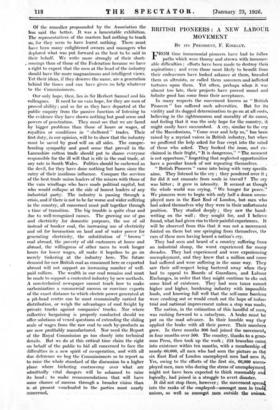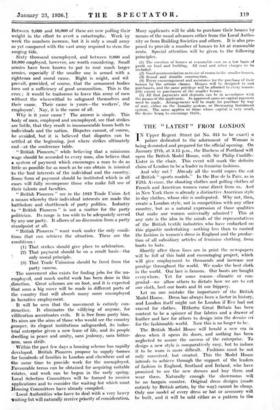BRITISH PIONEERS : A NEW LABOUR MOVEMENT
BY ITS PRESIDENT, F. KIRKLEY.
FROM time immemorial pioneers have had to follovt paths which were thorny and strewn with innumer- able difficulties ; efforts have been made to destroy their aspirations ; and even those most likely to benefit from their endeavours have looked askance at them; branded them as altruists, or called them sorcerers -and inflicted tortures upon them. Yet often, perhaps., when it. waf.) almost too late, their projects have proved sound and infinite good has come from their acceptance.
In many respects the movement known as " British Pioneers " has suffered such adversities. But for its virility and its dogged determination to go. on at all costs, believing in the righteousness and morality of its cause, and feeling that it was the only hope for the country, it might easily have succumbed. A cry, similar to the cry of the Macedonians, " Come over and help us," has been raised by a myriad- voices in British industry, but when we proffered the help asked for fear crept into the mind of those who asked. They burked the issue, and ex- claimed in their fright, " It is dangerous," "The. moment is not opportune," forgetting that neglected opportunities have a peculiar knack of not repeating themselves.
" British Pioneers " came into being with very specific aims. They listened to the cry ; they pondered over it ; for did it not emanate from souls in travail ? The cry was bitter ; it grew in intensity. It seemed as though the whole world was crying, " We hunger for peace." We pioneers were to begin with only half a dozen unem- ployed men in the East End of London, but men who had asked themselves why they were in their unfortunate position. They studied deeply ; they saw the hand- writing on the wall ; they sought for, and I believe found, what had given rise to their painful experiences. It will be observed from this that it was not a movement foisted on them but one springing from themselves, the ears of these men having heard a nation's cry.
They had seen and heard of a country suffering from an industrial slump, the worst experienced for many decades. They had experienced and were experiencing unemployment, and they knew that a million and more had suffered and were suffering in the same way. They saw their self-respect being bartered away when they had to appeal to Boards of Guardians, and Labour Exchanges, in order that they might continue to eke out some kind of existence. They had seen taxes mount higher and higher, burdening industry with impossible loads, and knowing full well that the self-same burdens were crushing out or would crush out the hope of indus- trial and national improvement unless a stop was made.
The nation, in the estimation of this handful of mens was rushing forward to a cataclysm. A brake must be put on the mad advance. In their humble way they applied the brake with all their power. Their numbers grew. In three months 300 had joined the movements in four months over 500. The country, thanks to a gene. rous Press, then took up the work ; 218 branches came into existence within ten months, with a membership ot. nearly, 60,000, all men who had seen the picture as th4 six East End of London unemployed men had seen its Yes, owing to the efforts of the first six, 60,000 unem, ployed men, men who during the stress of unemployment might not have been expected to think reasonably and logically, had joined in a struggle to avert disaster.
It did not stop there, however ; the movement spread, into the ranks of the employed—amongst men in trad unions, as well as amongst men outside the unions. Between 9,000 and 10,000 of these are now pulling their weight in the effort to avert a catastrophe. Week by week the numbers increase, but it is only a small army as yet compared with the vast army required to stern the surging tide.
Sixty thousand unemployed, and between 9,000 and l0,000 employed, however, are worth considering. Small armies have been known to put to rout much larger armies; especially if the smaller one is armed with a righteous and moral cause. Right is might, and wil prevail, provided, of course, that the armament bodies turn out a sufficiency of good ammunition. This is the crux ; it would be traitorous to leave this army of men without the wherewithal to safeguard themselves and their cause. Their cause is yours—the workers', the employers!. Nay, it is the cause of all.
Why is it your cause ? The answer is simple. This body of men, employed and unemployed, see that strikes are futile, that they result in immeasurable losses both to individuals and the nation. Disputes cannot, of course, be avoided, but it is believed that disputes can be settled - at the beginning, just where strikes ultimately end--L,at the conference table. • .
" British Pioneers," while believing that a minimum wage should be accorded to every man, also believe that a system of payment which encourages a man to do as little. as possible for as much as he can obtain is inimical rto the best interests of the individual and the country. Some.form of payment should be instituted which in all eases Will- fully recompense those who make full use of their talents and faculties. - • " British - Pioneers " see in the 1918 Trade Union Act a means whereby their individual interests are made the battledore and shuttlecock of party politics. Industry to " British Pioneers " is not a matter for the party politician. Its range is too wide to be adequately served by any one party. It allows of no discussion from a party standpoint at all-.
" British Pioneers " want work under the only condi- tions that can retrieve the situation. These are the conditions : • • -(1) That strikes should give place to arbitration.
(2) That payment should be on a result basis—the only moral principle.
(3) That Trade Unionism should be freed from the party caucus.
' The Movement also exists for finding jobs for the un- employed, and much useful work has been done in this ,direction. 'Great schemes are on foot, and it is expected that soon a big move will be made in different parts of the country that will absorb many more unemployed in lucrative employment.
It will be seen that the movement is entirely con- structive. It eliminates the vilifying of anyone, for vilification accentuates evils. It is free from party bias. Its aims are the aims of those who would see the country prosper, its elegant institutions safeguarded, its indus- trial enterprise given a new lease of life, and its people dwelling in peace and amity, sang jealousy, sans bitter- ness, sans strife. • Within the past few days a housing scheme- has rapidly developed. British Pioneers propose to supply -theirses for hundreds of families in London and elsewhere and at the same time to provide work for the unemployed: Favourable terms can be obtained for acquiring suitable estates, and work can be begun in the early spring. Local Selection Committees will be formed to -receive applications and to consider the waiting list which:most Mousing Committees have already compiled.
—.Local Authorities who have...to deal with a- very heavy baiting list will naturally receive priority of consideration. Many applicants will be able to purchase their houses by means of the usual advances either from the Local Autho- rity or from Building Societies and others. It is also pro- posed to provide a number of houses to let at reasonable rents. Special attention will be given to the following principles.
(1) The erection of houses at reasonable cost on a low basis of profit on land and building. All road and other charges to be included.
(2) Good accommodation as to size of rooms in the smaller houses.
(3) Sound and durable construction.
(4) Every encouragement and assistance for the purchase of their houses by the artisan classes. Houses will bo designed to suit purchasers, and the same privilege will be afforded to every reason- able extent to purchasers of the smaller houses. (5) AU first payments and deposits can be in accordance with the means of the applicants. In approved cases no capital payment need be made. Arrangements will be made for purchase by way of rent, either on the Annuity system, or Decreasing Instalment system. The same applies to those whose capital is very small, the desire being to encourage thrift.











































 Previous page
Previous page